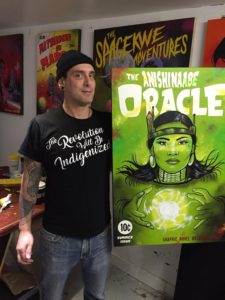Imagery speaks to culture and resilience, the art of Jay Soule

By Brian Wright-McLeod
TORONTO— The Idle No More movement was a high-water mark for contemporary Indigenous activism across Canada. It was also the catalyst for grassroots entrepreneur Jay Soule who was inspired to act in a creative way.
“When Idle No More kicked off, I felt I needed a change from what I was doing,” he said. “I did some research and watched what was going on.”
Simple and direct, his imagery resonates with many consumers of his t-shirts and paintings. But it was a long road to arrive at his current status as a sole proprietor of business and a creator of unique designs.
Originally from the Chippewas of the Thames First Nation, he was adopted and raised in a non-Indigenous family that he left at the age of 16. Admittedly, it was not an ideal situation and it led to a rugged life on the streets that fostered a level of awareness that unwittingly set a path to entrepreneurial opportunities.
“I learned tattooing in Florida and then in England in 2001,” he said. “I had some friends there, so I went to hang out with them.”
His struggles growing up existed outside of the Indigenous community.
Soule recently opened a retail store front, studio and tattoo parlour called Chippewar Nation on Toronto’s famed Queen Street West, an area renowned for its alternative arts and music scene. Prior to occupying his current location, Soule operated a store further up the street at Queen and Bathurst for 14 years.
“I got business development loans through my reserve and support from backers who believed in what I was doing,” he explained.
His experience in silk screening was derived from his experience in the tattoo industry.
“I ran a silk screening business for a long time, so I’ve been at this a while, learning the ropes of running a business and dealing with all the aspects that it involves,” he said.
The walls of Soule’s shop showcase paintings and silk-screened apparel adorned with his original designs.
There has to be a diverse effort to bring everything together far beyond a brick-and-mortar location.
“It’s the pow wow trail, online presence, travelling to art shows,” he said. “You have to be out there engaging the public. It’s not one thing. It has to be a push engaging all of them to be successful.”
Soule’s images have appeared in catalogues and exhibits for Toronto’s all Indigenous imagiNative film festival.
“I showed paintings with them for three years including the Movie Monster series, the Cult Classic series and the Tool Kit for Revolution,” he said.
Though his Indigenous imagery might be perceived as activist based, Soule’s perspective is not as obvious.
“I wouldn’t say that my work is political. I’m just stating the obvious,” he said. “I’m reacting to what I see around me and I’m learning about what’s going on in the community – things that need a spotlight and I’m simply contributing to that effort.”
His next steps involve filmmaking and larger pieces in murals. But his determination is unbowed, and serves as an example for upcoming entrepreneurs.
“My success has come from more than 15 years in the industry,” he said. “If someone wants to do this, it’s all about hard work being original in order to achieve your goals.”

